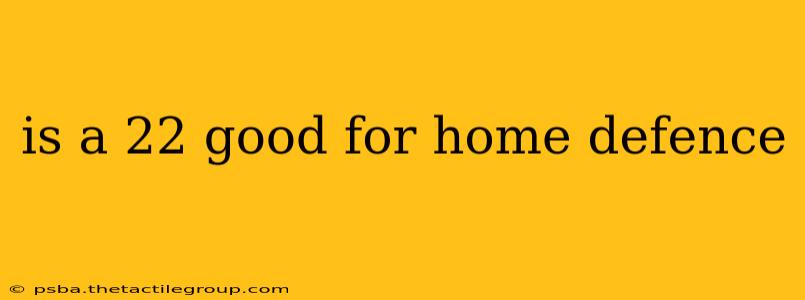Is a .22 LR Good for Home Defense? A Comprehensive Look at the Caliber's Capabilities
The question of whether a .22 LR is suitable for home defense is complex and sparks passionate debate among firearms enthusiasts and self-defense experts. There's no simple yes or no answer, as the effectiveness depends on several crucial factors. While a .22 LR is undeniably easy to shoot, inexpensive to practice with, and readily available, its limitations in stopping power must be carefully considered.
Understanding the Limitations of .22 LR for Self-Defense
The .22 LR cartridge is known for its low recoil and manageable noise, making it attractive to new shooters. However, its small size translates to significantly less stopping power compared to larger calibers like 9mm, .40 S&W, or .45 ACP. The smaller bullet creates a smaller wound channel, potentially leading to less immediate incapacitation of an attacker.
Key drawbacks include:
- Lower penetration: .22 LR rounds may not penetrate deeply enough to reliably stop a threat, especially through clothing or obstacles. This is particularly important in a home defense scenario where you might need to engage a target through walls or doors.
- Reduced stopping power: The smaller projectile and lower energy transfer often result in less immediate incapacitation. An attacker might remain mobile and dangerous even after being struck.
- Over-penetration risk: While not as significant a concern as with larger calibers, over-penetration is still a possibility, especially with certain types of ammunition. This is a critical concern in densely populated areas or homes with thin walls.
When a .22 LR Might Be Considered
Despite the limitations, there are specific scenarios where a .22 LR could be a viable option, albeit as a last resort:
- Extremely close-range engagements: At very close distances, the accuracy and ease of use of a .22 LR might outweigh its lower stopping power.
- Limited physical capabilities: For individuals with limited upper body strength or those recovering from injury, a .22 LR's low recoil can be a significant advantage.
- Superior to nothing: In a situation where no other firearm is available, a .22 LR is undoubtedly better than no defense at all.
Essential Considerations for Choosing a Home Defense Weapon
The choice of a home defense firearm should prioritize stopping power, reliability, and manageable recoil. While personal preference plays a role, expert advice leans heavily toward calibers offering higher penetration and stopping power. Factors to consider include:
- Caliber: Larger calibers like 9mm, .40 S&W, and .45 ACP offer significantly greater stopping power and penetration.
- Firearm reliability: A malfunction in a critical moment can be catastrophic. Choose a reliable firearm with a proven track record.
- Ammunition capacity: A higher capacity magazine allows for more shots before needing a reload.
- Training and practice: Regardless of the chosen caliber, rigorous training and regular practice are essential for safe and effective home defense.
Conclusion: Prioritize Stopping Power
While a .22 LR can be a suitable firearm for target practice or small game hunting, it should not be the primary choice for home defense. The potential limitations in stopping power and penetration present significant risks in a high-stakes self-defense situation. Investing in appropriate training and selecting a firearm with greater stopping power is crucial for ensuring the safety and protection of your household. Consult with law enforcement and firearm experts to make an informed decision. This information is for educational purposes only and should not be considered legal or firearms advice. Always comply with local and federal laws regarding firearms ownership and usage.

